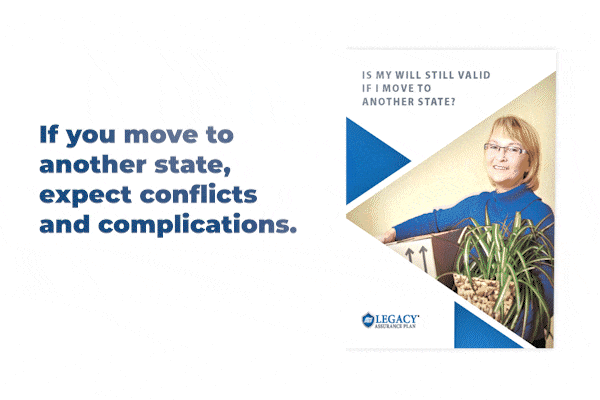If you are interested in moving to a new state, take a moment to review the provisions of your will and the laws of the state you are looking to relocate to in order to identify potential pitfalls and problems.

A common question asked by individuals with a last will and testament is whether or not their will is respected across state lines and can be transported to a different state if they relocate. The short answer is generally yes. When a will is properly executed in accordance with the requirements established under state law, it should be regarded as a valid and executable will in a different state.
However, it is important to understand that the requirements for a will to be deemed valid and the rules surrounding the interpretation of a will are governed by state law and differ from state to state. This is why it is recommended that you speak to an experienced trust and estate attorney if you are planning to relocate to a different state. They can provide important insight into potential pitfalls and conflicts in different state laws.
Here are some examples of potential conflicts between the different states when it comes to last will and testaments.
Location of signatures
Different states will specify the location in the will document of the signatures of the testator (i.e. person creating the will) and the witnesses.
Beneficiaries as witnesses
Similarly, many states have different requirements when it comes to the presence of witnesses during the execution of a will. In some states, it is perfectly fine for a beneficiary to be a witness. In other states, the answer is no.
The protocol for creating a valid, self-proving affidavit

A "self-proving" affidavit is a document established under oath, typically in the presence of a notary public. A self-proving affidavit can be extremely useful since it states that the will should be deemed valid in any state. Many people attach the self-proving affidavit to their will. However, potential issues can arise with the specific form of the self-proving affidavit. For example, under Florida law, both the testator and witnesses are required to sign the self-proving affidavit. In contrast, if you relocated to, let's say Connecticut, the state law has established that only witnesses are legally required to sign the affidavit in order for the will to be deemed valid.
"Holographic" last will and testament
A "holographic" will is generally not witnessed by third parties and hand-written by the testator. In some states, a holographic will is not valid. In other states, a holographic will could be valid, dependent upon certain factors. For example, both Maryland and New York have laws in place that recognize holographic wills, but only if they are made by members of the U.S. armed forces.
The process for disinheriting a child
In some states, if you decide to disinherit a child, you are obligated to specifically state the disinheritance decision in your will or provide the disinherited child a "nominal bequest" such as $5. However, in other states, there is no such requirement. For example, pursuant to Massachusetts law, a disinherited child must be specifically mentioned and disinherited in a will. This means a disinherited child could potentially challenge the terms of your will and seek a court order directing your estate to provide an amount of money that the child would have received if they were named in the will. In contrast, if you lived in Pennsylvania, the governing state laws have established that a disinherited child has no legal recourse simply because they are not named in a will.
Change in marital status
Changes to your marital status, whether it be a divorce or a new marriage, could impact your will differently depending on the state. For example, in some states, a new marriage will actually revoke your will. Yes, you read that correctly. If you get re-married in certain states, it could effectively nullify your will. In other states, a new marriage has zero impact on your will.

Similarly, in some states, getting divorced will revoke your will. In other states, a divorce will simply revoke the benefits that would have been conveyed to your ex-spouse.
Out-of-state personal representatives
In some states, a non-resident is prohibited from serving as your personal representative. This is extremely important to determine if you decide to relocate to a new state since the personal representative is empowered to administer the provisions of your will. If that individual is determined to be ineligible to serve in this capacity, it could be extremely detrimental to the effective execution of your will.
In addition to the risk of a non-resident not being allowed to serve your personal representative, there are other significant burdens associated with having an out-of-state individual probate the will. For example, your personal representative could be forced to hire an attorney, post a bond and appoint a resident agent in the new state where you relocated to prior to your death.
Relocating for tax purposes
If you are considering relocating from State A to State B for tax purposes, you may want to consider drafting a new will in your new state of residence. Why? Because assessing where an individual is domiciled for tax purposes involves an analysis of multiple factors, including where you drafted and executed the will. This means if you are relocating from Maryland to South Carolina due to tax considerations, it would strengthen your domicile argument if you have a will that was drafted and executed in South Carolina. If you were to relocate and suddenly pass away with a will that was drafted and executed in Maryland, the address on your driver's license is in Maryland, you were registered to vote in Maryland, your attorney is based in Maryland, etc., then a court could deem you still domiciled in Maryland for tax purposes.
Portability of your will in a different country
If you decide to relocate to another country, it is important to understand that the Full Faith and Credit Clause of the U.S. Constitution generally would not protect the provisions of your will. However, the U.S. government does have agreements in place with other countries that require the foreign country to honor the terms and provisions of a will drafted and executed in America. If you are contemplating a move to another country, it would be prudent to sit down and speak with an experienced trust and estate attorney.
Speak to an advisor sooner rather than later
Relocating to a different state, or different country, can impact the validity of your will or specific provisions within your will. That is why it makes sense to speak with an experienced trust and estate advisor and discuss the best path forward.


